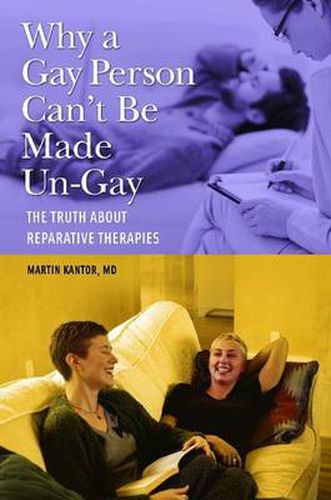Readings Newsletter
Become a Readings Member to make your shopping experience even easier.
Sign in or sign up for free!
You’re not far away from qualifying for FREE standard shipping within Australia
You’ve qualified for FREE standard shipping within Australia
The cart is loading…






Despite an abysmal success rate, practitioners still use reparative therapy in an attempt to turn gays and lesbians straight. This text exposes the pitfalls that should be considered before gays embark on this journey that typically leads nowhere.
Although homosexuality is becoming less stigmatized in American culture, gays and lesbians still face strong social, familial, financial, or career pressures to convert to being heterosexuals. In this groundbreaking book, longtime psychiatrist Martin Kantor, MD-himself homosexual and once immersed in therapy to become straight -explains why so-called reparative therapy is not only ineffective, but should not be practiced due its faulty theoretical bases and the deeper, lasting damage it can cause.
This standout work delves into the history of reparative therapy, describes the findings of major research studies, and discusses outcome studies and ethical and moral considerations. Author Kantor identifies the serious harm that can result from reparative therapy, exposes the religious underpinnings of the process, and addresses the cognitive errors reparative therapy practitioners make while also recognizing some positive features of this mode of treatment. One section of the book is dedicated to discussing the therapeutic process itself, with a focus on therapeutic errors that are part of its fabric. Finally, the author identifies affirmative eclectic therapy-not reparative therapy-as an appropriate avenue for gays who feel they need help, with goals of resolving troubling aspects of their lives that may or may not be related to being homosexual, and of self-acceptance rather than self-mutation.
Presents thorough descriptions of the various reparative therapies, contrasts these techniques with traditional therapy, and exposes the faulty theoretical bases of this form of treatment
Details the author psychiatrist’s unsuccessful 5-year-long therapeutic attempt to change his own homosexuality
Provides essential information that gays and their parents need to know before embarking on what the author feels is a futile course of changing sexual orientation. The content will enlighten politicians and reparative therapists themselves as well
Supplies an essential, informed counterpoint to the existing literature on reparative therapy
$9.00 standard shipping within Australia
FREE standard shipping within Australia for orders over $100.00
Express & International shipping calculated at checkout
Despite an abysmal success rate, practitioners still use reparative therapy in an attempt to turn gays and lesbians straight. This text exposes the pitfalls that should be considered before gays embark on this journey that typically leads nowhere.
Although homosexuality is becoming less stigmatized in American culture, gays and lesbians still face strong social, familial, financial, or career pressures to convert to being heterosexuals. In this groundbreaking book, longtime psychiatrist Martin Kantor, MD-himself homosexual and once immersed in therapy to become straight -explains why so-called reparative therapy is not only ineffective, but should not be practiced due its faulty theoretical bases and the deeper, lasting damage it can cause.
This standout work delves into the history of reparative therapy, describes the findings of major research studies, and discusses outcome studies and ethical and moral considerations. Author Kantor identifies the serious harm that can result from reparative therapy, exposes the religious underpinnings of the process, and addresses the cognitive errors reparative therapy practitioners make while also recognizing some positive features of this mode of treatment. One section of the book is dedicated to discussing the therapeutic process itself, with a focus on therapeutic errors that are part of its fabric. Finally, the author identifies affirmative eclectic therapy-not reparative therapy-as an appropriate avenue for gays who feel they need help, with goals of resolving troubling aspects of their lives that may or may not be related to being homosexual, and of self-acceptance rather than self-mutation.
Presents thorough descriptions of the various reparative therapies, contrasts these techniques with traditional therapy, and exposes the faulty theoretical bases of this form of treatment
Details the author psychiatrist’s unsuccessful 5-year-long therapeutic attempt to change his own homosexuality
Provides essential information that gays and their parents need to know before embarking on what the author feels is a futile course of changing sexual orientation. The content will enlighten politicians and reparative therapists themselves as well
Supplies an essential, informed counterpoint to the existing literature on reparative therapy